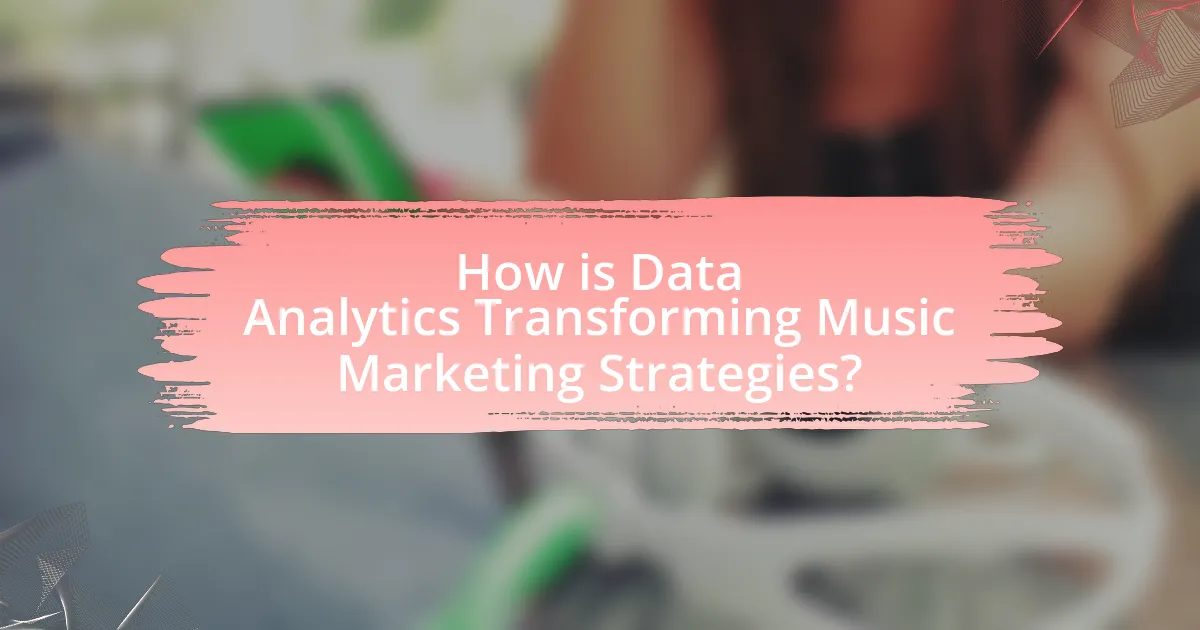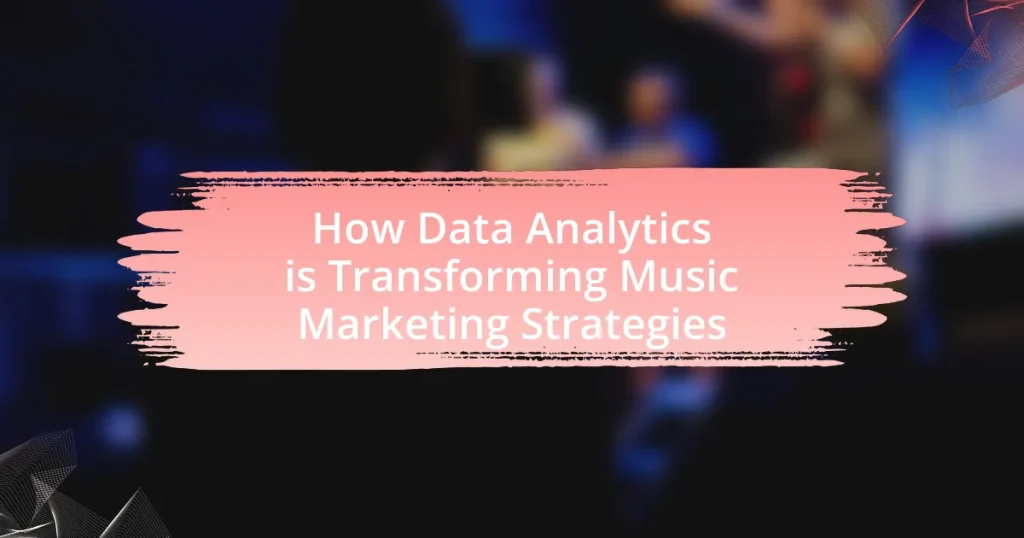Data analytics is revolutionizing music marketing strategies by facilitating targeted audience engagement and personalized campaigns. By leveraging insights from streaming data, social media interactions, and listener demographics, music marketers can effectively identify and reach specific audience segments. Key findings indicate that 70% of music marketers believe data-driven strategies enhance their ability to connect with potential fans, leading to improved marketing efficiency and increased success in album launches and concert promotions. The article explores the role of data analytics in understanding audience preferences, the types of valuable data for marketers, and the emerging technologies shaping these strategies, while also addressing the challenges and best practices in implementing data analytics within the music industry.

How is Data Analytics Transforming Music Marketing Strategies?
Data analytics is transforming music marketing strategies by enabling targeted audience engagement and personalized marketing campaigns. By analyzing streaming data, social media interactions, and listener demographics, music marketers can identify specific audience segments and tailor their promotional efforts accordingly. For instance, platforms like Spotify and Apple Music provide insights into listener behavior, allowing artists and labels to optimize release strategies and marketing messages. According to a report by Nielsen Music, 70% of music marketers believe that data-driven strategies significantly enhance their ability to reach potential fans effectively. This shift towards data-centric approaches not only improves marketing efficiency but also increases the likelihood of successful album launches and concert promotions.
What role does data analytics play in music marketing?
Data analytics plays a crucial role in music marketing by enabling artists and labels to understand audience preferences and behaviors. By analyzing streaming data, social media interactions, and demographic information, music marketers can tailor their campaigns to target specific listener segments effectively. For instance, a study by Nielsen Music found that 70% of music listeners are influenced by personalized recommendations, highlighting the importance of data-driven strategies in reaching potential fans. This targeted approach not only increases engagement but also optimizes marketing budgets by focusing resources on the most promising opportunities.
How do music marketers utilize data analytics for audience insights?
Music marketers utilize data analytics to gain audience insights by analyzing streaming data, social media interactions, and demographic information. This analysis allows them to identify listener preferences, track engagement levels, and segment audiences effectively. For instance, platforms like Spotify and Apple Music provide detailed analytics on user behavior, enabling marketers to tailor their campaigns to specific audience segments. According to a report by Nielsen Music, 70% of music marketers who leverage data analytics report improved targeting and engagement in their campaigns. This data-driven approach enhances decision-making and optimizes marketing strategies, ultimately leading to increased fan engagement and revenue.
What types of data are most valuable in music marketing?
The most valuable types of data in music marketing include audience demographics, streaming analytics, social media engagement metrics, and sales data. Audience demographics provide insights into age, gender, and location, allowing marketers to tailor campaigns effectively. Streaming analytics reveal listener behavior, such as play counts and skip rates, which help identify popular tracks and optimize playlists. Social media engagement metrics, including likes, shares, and comments, indicate fan interaction and sentiment, guiding promotional strategies. Sales data, encompassing digital downloads and merchandise purchases, offers a clear picture of revenue generation and market demand. Collectively, these data types enable music marketers to make informed decisions and enhance their marketing strategies.
Why is data-driven decision-making important in the music industry?
Data-driven decision-making is important in the music industry because it enables stakeholders to make informed choices based on empirical evidence rather than intuition. By analyzing data on listener preferences, streaming patterns, and social media engagement, music industry professionals can tailor marketing strategies to target specific audiences effectively. For instance, a report by Nielsen Music indicates that data analytics can increase the effectiveness of promotional campaigns by up to 30%, demonstrating the tangible benefits of leveraging data in decision-making processes. This approach not only enhances audience engagement but also optimizes resource allocation, ultimately driving revenue growth in a highly competitive market.
How does data analytics improve marketing campaign effectiveness?
Data analytics improves marketing campaign effectiveness by enabling marketers to make data-driven decisions that enhance targeting and personalization. By analyzing consumer behavior, preferences, and engagement metrics, marketers can identify the most effective channels and messages for reaching their audience. For instance, a study by McKinsey found that companies using data analytics in their marketing strategies can increase their marketing ROI by 15-20%. This quantifiable improvement demonstrates how leveraging data analytics leads to more efficient allocation of resources and higher conversion rates in marketing campaigns.
What are the risks of not using data analytics in music marketing?
Not using data analytics in music marketing significantly increases the risk of ineffective targeting and wasted resources. Without data-driven insights, marketers may fail to identify the preferences and behaviors of their audience, leading to campaigns that do not resonate. For instance, a study by Nielsen Music found that targeted marketing efforts based on listener data can increase engagement by up to 30%. Additionally, the absence of analytics can result in missed opportunities for optimizing promotional strategies, as marketers lack the ability to measure performance and adjust tactics accordingly. This can lead to lower sales, reduced fan engagement, and ultimately, a decline in revenue for artists and labels.
What are the key trends in data analytics for music marketing?
Key trends in data analytics for music marketing include the use of predictive analytics, audience segmentation, and real-time data tracking. Predictive analytics enables music marketers to forecast trends and consumer behavior, allowing for more targeted campaigns. Audience segmentation allows for personalized marketing strategies based on demographic and behavioral data, enhancing engagement. Real-time data tracking provides insights into listener preferences and campaign performance, facilitating immediate adjustments to marketing strategies. These trends are supported by industry reports indicating that data-driven marketing can increase engagement rates by up to 30%, demonstrating the effectiveness of these analytics in optimizing music marketing efforts.
How are streaming platforms influencing data analytics strategies?
Streaming platforms are significantly influencing data analytics strategies by providing real-time user engagement metrics and consumption patterns. These platforms, such as Spotify and Apple Music, generate vast amounts of data on listener preferences, behaviors, and trends, which marketers leverage to tailor their campaigns. For instance, Spotify’s Wrapped feature showcases personalized year-end summaries, illustrating how user data can inform marketing strategies and enhance user engagement. This data-driven approach allows music marketers to optimize content delivery, target specific demographics, and predict future trends, ultimately leading to more effective marketing strategies in the music industry.
What emerging technologies are shaping data analytics in music marketing?
Emerging technologies shaping data analytics in music marketing include artificial intelligence, machine learning, and blockchain. Artificial intelligence enables predictive analytics, allowing marketers to forecast trends and consumer behavior based on large datasets. Machine learning algorithms analyze listener preferences and engagement patterns, optimizing targeted advertising and content recommendations. Blockchain technology enhances transparency and security in data transactions, ensuring accurate tracking of music rights and royalties. These technologies collectively improve decision-making processes and enhance the effectiveness of marketing strategies in the music industry.
How can artists leverage data analytics for their marketing strategies?
Artists can leverage data analytics for their marketing strategies by analyzing audience demographics, engagement metrics, and streaming data to tailor their promotional efforts effectively. By utilizing platforms like Spotify for Artists and social media analytics tools, musicians can gain insights into listener preferences, geographic locations, and listening habits. For instance, a study by Nielsen Music found that artists who used data analytics to understand their audience saw a 30% increase in concert attendance. This data-driven approach allows artists to optimize their marketing campaigns, target specific demographics, and enhance fan engagement, ultimately leading to increased sales and brand loyalty.
What tools are available for artists to analyze their audience data?
Artists can utilize several tools to analyze their audience data, including Google Analytics, Spotify for Artists, and Facebook Insights. Google Analytics provides detailed insights into website traffic and user behavior, allowing artists to understand how audiences interact with their online presence. Spotify for Artists offers metrics on listener demographics, streaming statistics, and engagement levels, enabling artists to tailor their marketing strategies effectively. Facebook Insights delivers data on audience engagement and demographics for social media platforms, helping artists refine their outreach efforts. These tools collectively empower artists to make data-driven decisions in their marketing strategies.
How can artists use data to enhance fan engagement?
Artists can use data to enhance fan engagement by analyzing audience behavior and preferences to tailor their marketing strategies. By leveraging data analytics tools, artists can gain insights into which songs resonate most with their fans, the demographics of their audience, and the platforms where their music is most frequently consumed. For example, Spotify’s data insights allow artists to see listener demographics and geographic locations, enabling them to create targeted promotional campaigns. Additionally, social media analytics can reveal engagement metrics, helping artists understand what content their fans interact with the most. This data-driven approach not only fosters a deeper connection with fans but also optimizes marketing efforts, leading to increased loyalty and attendance at events.
What challenges do marketers face when implementing data analytics?
Marketers face several challenges when implementing data analytics, including data integration, data quality, and skill gaps. Data integration issues arise when marketers struggle to consolidate data from various sources, leading to fragmented insights. Data quality challenges occur when the data collected is inaccurate or incomplete, which can skew analysis and decision-making. Additionally, skill gaps exist as many marketers may lack the necessary expertise in data analytics tools and techniques, hindering their ability to effectively interpret data and derive actionable insights. According to a report by Deloitte, 63% of marketers cite data integration as a significant barrier to effective analytics, highlighting the prevalence of these challenges in the industry.
How can data privacy concerns impact music marketing strategies?
Data privacy concerns can significantly impact music marketing strategies by limiting the collection and use of consumer data for targeted advertising. As regulations like the General Data Protection Regulation (GDPR) and the California Consumer Privacy Act (CCPA) impose strict guidelines on data usage, music marketers must adapt their strategies to comply with these laws. For instance, marketers may need to rely more on aggregated data rather than individual user data, which can reduce the effectiveness of personalized marketing campaigns. Additionally, consumer trust is crucial; if audiences feel their data is not being handled responsibly, they may disengage from platforms or artists, leading to decreased engagement and sales. According to a 2021 survey by the International Association of Privacy Professionals, 79% of consumers expressed concerns about how their data is used, highlighting the need for transparency and ethical practices in music marketing.
What are common pitfalls in data analytics for music marketing?
Common pitfalls in data analytics for music marketing include relying on incomplete data, misinterpreting metrics, and neglecting audience segmentation. Incomplete data can lead to skewed insights, as decisions based on partial information may not accurately reflect audience behavior or preferences. Misinterpreting metrics, such as confusing correlation with causation, can result in misguided strategies that do not effectively engage listeners. Additionally, neglecting audience segmentation can cause marketers to overlook specific demographics, leading to generic campaigns that fail to resonate with targeted groups. These pitfalls can hinder the effectiveness of marketing strategies and limit the potential for successful audience engagement.
What best practices should be followed in music marketing analytics?
Best practices in music marketing analytics include leveraging data to understand audience behavior, utilizing A/B testing for campaign optimization, and integrating multiple data sources for comprehensive insights. Analyzing streaming data reveals listener demographics and preferences, which can inform targeted marketing strategies. A/B testing allows marketers to compare different promotional approaches, enhancing engagement and conversion rates. Additionally, integrating data from social media, streaming platforms, and sales can provide a holistic view of performance, enabling more effective decision-making. According to a report by Nielsen Music, artists who utilize data analytics effectively can increase their audience engagement by up to 30%.
How can marketers ensure data accuracy and reliability?
Marketers can ensure data accuracy and reliability by implementing rigorous data validation processes and utilizing advanced analytics tools. Data validation involves checking for errors, inconsistencies, and completeness in datasets, which can be achieved through automated systems that flag anomalies. Advanced analytics tools, such as machine learning algorithms, can analyze large volumes of data to identify patterns and trends, enhancing the reliability of insights derived from the data. According to a study by McKinsey & Company, organizations that prioritize data quality see a 15-25% increase in productivity, demonstrating the tangible benefits of accurate and reliable data in decision-making processes.
What strategies can enhance the effectiveness of data-driven marketing campaigns?
To enhance the effectiveness of data-driven marketing campaigns, marketers should implement segmentation, personalization, and continuous optimization. Segmentation allows marketers to categorize audiences based on behavior and preferences, leading to targeted messaging that resonates more deeply with specific groups. Personalization further refines this approach by tailoring content and offers to individual user data, which has been shown to increase engagement rates significantly; for instance, personalized emails can generate six times higher transaction rates compared to non-personalized ones. Continuous optimization involves analyzing campaign performance in real-time and making data-informed adjustments to improve outcomes, which is supported by research indicating that companies using data analytics for optimization see a 20% increase in marketing ROI.


